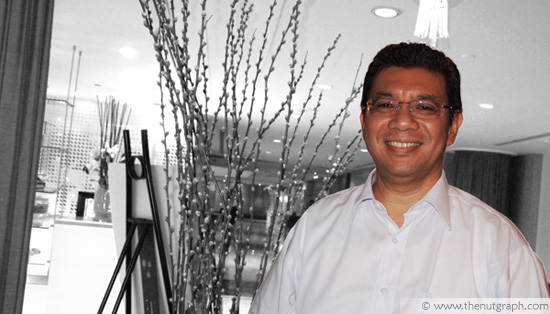
DATUK Saifuddin Abdullah says he’s a reluctant politician. And perhaps it is this reluctance and a preference for engagement that is the reason the Barisan Nasional (BN) Member of Parliament (MP) for Temerloh, who was elected in 2008, appeals to reform-minded Malaysians.
Saifuddin is an Umno supreme council member who knows his strain of “progressive” politics is not the mainstream within the party. The deputy higher education minister stood out when he criticised the government’s handling of the 9 July 2011 Bersih 2.0 rally. He has also been vocal about academic and student freedoms. He disagreed with Universiti Islam Antarabangsa’s suspension of law professor Abdul Aziz Bari, and has consistently supported amendments to the Universities and University Colleges Act (UUCA) to allow student participation in politics. In recent months, Saifuddin has been holding roundtable dialogues with various stakeholders to gather feedback on the proposed amendments.
His openness in engaging students has drawn fire from certain groups. Last year, a pro-establishment student group demanded that Saifuddin resign after a student protester momentarily lowered a flag bearing the Umno president’s image outside the party headquarters.
When The Nut Graph met Saifuddin for this 5 Jan 2012 interview in Kuala Lumpur, he was just hours away from chairing yet another student discussion on the UUCA. The long-time youth activist, who was the Malaysian Youth Council’s longest-serving president from 1998 to 2002, explains why he left civil society work to join politics, and what he wishes there were more of in Malaysia.
TNG: Where and when were you born?
I was born on 27 Jan 1961 at the hospital in Mentakab, Pahang. I grew up in Kampung Sungai Ara, in Mentakab in the district of Temerloh, for 17 years. My late parents rented a small kampung house beside the river, Sungai Semantan, a tributary of Sungai Pahang. The house was without piped water or electricity. We bathed in the river and collected water in pails to boil for drinking and cooking. The whole kampung had no electricity, so we used oil or gasoline lamps.
We fished a lot, and fish in those days were plentiful and easy to catch.
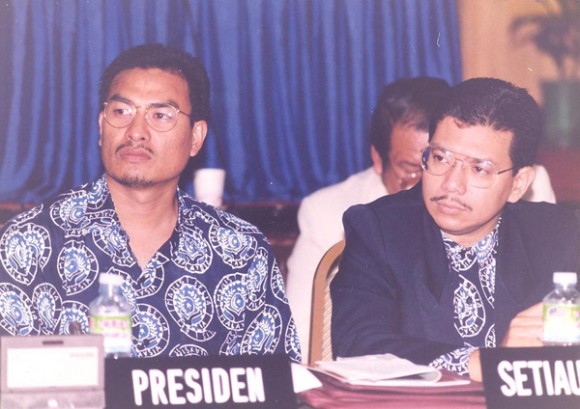
What are your memories of growing up and of school?
I went to an English-medium school, Sekolah Rendah Abu Bakar in Mentakab. Both my parents were teachers at a Malay-medium school. The English-medium school was in town so I had to take a bus. When it was time for my younger brothers and sisters to go to school, there were no more English-medium schools.
I came from a very small, all-Malay kampung with hardly 20 houses. Of that, 18 homes were families of Kampar descent. Kampar is an area [with] people from Sumatra. Their Kampar dialect sounds like Minang, so I think they are cousins. So I learnt the Kampar dialect and can speak it quite well in addition to the Malay Temerloh dialect.
Coming from an all-Malay kampung and going to a mixed English-medium school was interesting. I was the only Malay boy who played basketball in school.
How did you end up in basketball?
I was never good at football or takraw. When I was thinking about what sport to take up in Standard Four, all I really wanted was something I had never played before, and new friends. I represented my school in basketball and later became a coach while I was working.
That is why I am always comfortable in the company of people of other races because that was part of my childhood. In fact, my parents had a good Chinese friend, Mr Wong, who was a teacher at Sekolah Jenis Kebangsaan (Cina) Chung Hwa. My father and he loved fishing. Mr Wong would come to our house often and we would visit his house during Chinese New Year.
Can you trace your ancestry?
Both my parents were born in Temerloh. But my father is of Sumatran lineage from a place known as Pagar Ruyung. The story goes that an ancestor set out exploring and came to settle in a place in Temerloh and started a village known as Mengkarak. Mengkarak was the name of this ancestor. The village is now in the district and parliamentary constituency of Bera.
Mengkarak was said to be a [person of nobility] who was very pious and had mystical powers.
On my mother’s side, there aren’t many stories about her ancestors. However, she is from Kampung Lebak, which is only about 15km from Mengkarak along the same river. And the people of Lebak speak exactly the same dialect as people in my father’s kampung of Mengkarak. There are altogether some 15 dialects in Pahang. But as she spoke the same dialect as my father’s people, it is likely she was also from the same ancestral line.
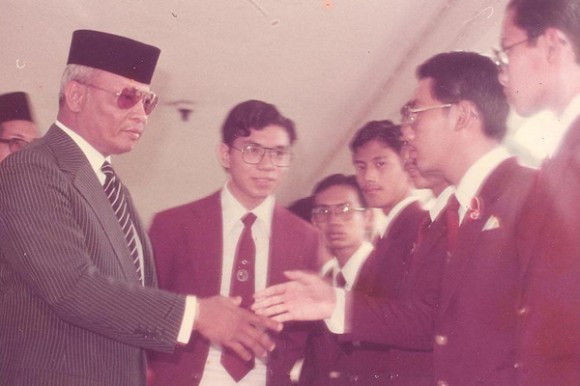
Your father was an ustaz – how might this have shaped who you are today?
My father was strict. From him, I learnt the religion. But even though he was a religious teacher, he was not conservative. He never dressed like one; his songkok was black, not white, and he didn’t sport a janggut. He also went to meet his friends in Chinese restaurants and was comfortable chatting with them there.
He didn’t influence me politically. But he taught me to take an interest in current affairs. He encouraged me to read newspapers and to watch the news on TV with him. He liked to read Berita Harian but not Utusan because even then he thought Utusan was too pro-Umno. He was a PAS supporter. We didn’t really discuss politics. Through him, I also came to know the writings of Muhammad Natsir, the Indonesian politician. His book Kapita Selekta was the first political book I read.
As a youth, what events or people shaped your interest in civil society, especially in non-governmental organisations and politics?
The earliest influence was the Baling demonstrations. I was just ending Form One at Malay College Kuala Kangsar (MCKK) when the demonstrations happened at the end of 1974, just before the school holidays. In Form Two, I remember our seniors explaining it to us – we had a speaker’s corner under a big tree at the school. Anwar Ibrahim, who is an MCKK old boy, had participated in the demonstration and, of course, news about his involvement reached us. The student leaders had views on the matter which were never published in the newspapers.
Later, I became a student leader myself. I was elected president of the student union but I was also appointed head prefect. I had to relinquish one position. So I gave up the student union and my deputy became the union president. His name is Zulkifli Alwi – the journalist who became Umno Youth assistant secretary under Datuk Seri Hishammuddin Hussein.
So I was head prefect, and in this capacity, I held my first peaceful assembly against our school principal!
Over what issue?
At that time MCKK’s rival in hockey was Clifford High School. On the evening of the assembly we lost to Clifford. The assembly was sparked by a remark the principal made when we lost the game. He said, “Ah, kalah. Padan muka.”
Now, there was already some background to this principal. He was new to the school and was notorious for shouting at people in public. He had shouted at some of our favourite teachers, and also shouted at one of the cooks. His “padan muka” remark was the last straw.
That evening I called everyone to the school hall. I gave a speech as head prefect, and [so did] Zulkifli as head of the student union. We demanded the headmaster come to the assembly that night and apologise to the hockey team in public. Ho, ho! We got a teacher to be a mediator, so he went round to the principal’s house. He came back and said, “Din, the principal is willing to apologise but asking him to come to the hall and do it in public is a bit too much. Can compromise?” So we arranged a smaller meeting the next day with 30 student representatives. The principal came and apologised. And after that, he became one of the best principals.
Why did you join politics in the end, after a long time in civil society?
I joined politics reluctantly … because after spending so much time in civil society, I found that I had reached a ceiling. I don’t see the government recognising civil society to the extent I think it should. Until now, I still feel that if I were working in civil society in places like the US, the UK or Australia, I would not have had to join politics because I would be able to get things done as a social activist. But I’m not ambitious. My wife, she still has to work in case I don’t get re-elected!
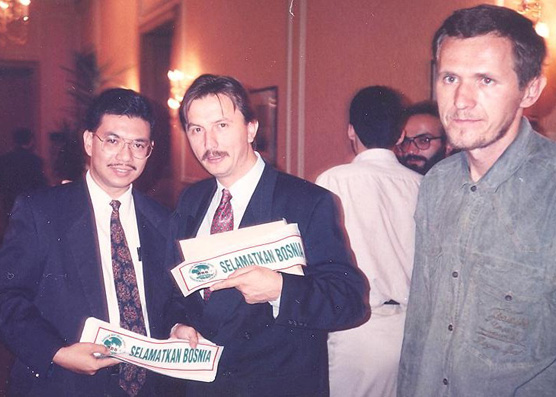
What are these things you want to get done?
Just to name one example – to see Section 15 of the UUCA amended. It’s something I’ve always fought for all this while. That is why I wrote the e-book Kalau Saya Mahasiswa to show people that this is not something I say just because I’m deputy minister. It’s something I’ve said all the while as a student and youth activist. Maybe nothing happened then because the timing was not right. Maybe there was not much political will on the government’s part then. But now, if you ask me for concrete evidence that joining politics can get things done, then this is probably it.
Why join Umno?
I believe Umno, in nature, is a moderate party. At that point in time when I chose to join politics, which is after I left university, it was the only Malay party that I felt comfortable in because it worked with the Chinese and Indian [Malaysians]. Not PAS, at that time, even though some ideological principles which I adhere to are also found in PAS. But PAS was a purely Malay party. The BN, on the other hand, was a multiracial coalition. So it was a natural choice because of my background with non-Malay friends.
How do you feel about Umno now compared to when you first joined it?
In as far as race relations are concerned, I think Umno is like it used to be, working with other races. I only wish that we were more progressive.
You are referring to Umno’s ideology of the Malay agenda?
Umno has had no ideology since day one. The only ideology it has is pragmatism. Of course, they talk about Malay rights and nationalism. And if you want to consider that ideology, I’m okay with that. I don’t see anything wrong with Umno still talking about the Malay agenda. However, the Malay agenda – I don’t even particularly like to use this term – must be talked about in a more comprehensive and inclusive way. If you have to talk about the Malay agenda, it must be in the context of Malaysia. It must not be in a vacuum.
Somebody asked me, is there still a need to talk about it? I said, look, it is a psychological and primordial need of any group of people to flock together. For so long as you understand that you are not operating in a vacuum, that you are not the only person in this country, you can talk about being a Malay. Nobody can stop you from calling yourself a Malay or from being one. So be a Malay, but in the context of Malaysia.
What sort of reactions do you get from within Umno to your progressive stand on issues?
Some see it as positive, as what Umno needs in order to be relevant. Others think I am too liberal or that I talk too much. Some even accuse me of doing a disservice to the party or of playing to the opposition’s tune. I try to explain to them that democracy belongs to everyone.
Do the negative reactions outweigh the positive?
I think, perhaps, more think I am doing a disservice to the party. Umno has three groups. There are progressives, but they are a minority. Then you have the “wait for boss” types, which is a bigger group than the first. The third are those who want the status quo. Even when the boss says “change”, they still want the status quo.
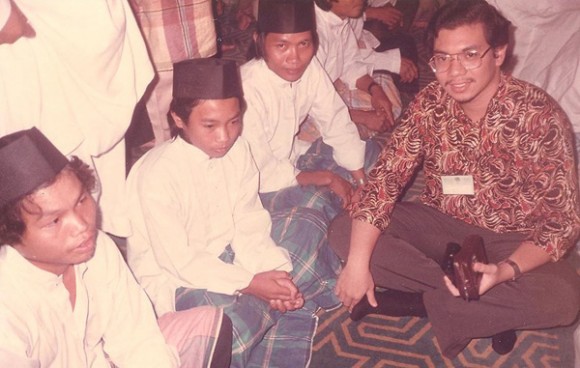
Can you imagine the president having to repeat himself more than once? What more when the prime minister made his Malaysia Day speech. One or two days after the speech where he said the Internal Security Act would be abolished, Emergency Ordinances would be repealed and there would be more press freedom, some of us had to take it upon ourselves to calm down party members and explain things to them. We did it quietly lah, of course. But we had to because we were getting negative reactions and complaints from members all round about the prime minister’s announcements.
And I thought we were supposed to be jubilant. I thought, wow, the opposition is going to have a tough time explaining. But the next day I looked at my phone and saw text messages full of complaints that the status quo was coming undone.
What does being Malaysian mean to you?
I think this is a country that allows you to be yourself, regardless of what you are.
But there are many laws curbing …
When it comes to certain laws, I agree, more needs to be done. I am in full support of having a law reform commission appointed by the King and reporting to Parliament. Their work should be to look at laws and acts, and see which are outdated. Every time Parliament meets, which is three times a year, there should be a report from this commission suggesting to the MPs the laws that need to be amended or changed.
Are there any aspects of being Malaysian that you struggle with?
Space [for] ideas [and] talent. As I said, Malaysia is a place where you can be yourself, but there are still confines. If only that space was enlarged, then every Malaysian would be able to be what he or she wants to be.
What kind of Malaysia do you want for future generations?
One with greater space! Malaysia is like a table. But we have made space on the table smaller by cluttering it with old customs, archaic laws, cultural excuses, myths, and a culture of fear. If only we could take these away then we will see that, ah, the table is big enough to accommodate everyone.
Let’s have space for our students to choose what they want to study. Let’s give them space to have the right to choose, and then educate them how to choose properly. One reason I joined politics was also to create this space. For this we need a new government framework, where the state, business and civil society work together in genuine partnership. When you create this framework, you create space for conversations from which good ideas can flow. ![]()
The book Found in Malaysia Volume 2, which was launched on Malaysia Day 2011, is now available in bookstores for RM50. It features previously unpublished interviews with Asha Gill, Lillian Too, Khairy Jamaluddin and Baru Bian. Volume 1 of Found in Malaysia, featuring 54 earlier interviews, is currently in its second print run and retailing at RM45.


Mohammad Ali Ismail says
I like this. He speaks his mind and doesn’t care less if his “boss” has tangential views.
Saifuddin is indeed a candid “reluctant politician” with vision of how Malaysia should be shaped. I hope that he succeeds.
Fiat sapientia virtus!
Helmi Ismail says
I’m OK with his line of thinking and talking. Its obviously a big drift from what I (and most people) think what Umno is (or has become), and way off from what Utusan has been shouting out. I see him as how Anwar was in his early years years in terms of trying to make changes “from within” – being in a party that forms THE government. Whatever his aspirations, whatever he has been doing, Umno is drifting further away from being relevant to the times and situations. Umno is just not Saifuddin, and Saifuddin is just not Umno.
P..S That hockey principal bit was admirable.